Geof Huth's Blog, page 42
January 7, 2011
January 6, 2011
It's O'er in about 121 Letters
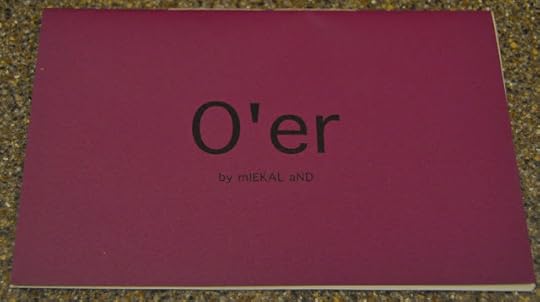 mIEKAL aND, O'er (25 December 2010)
mIEKAL aND, O'er (25 December 2010)My friend mIEKAL aND decided to turn 53 on Christmas Day last year. It was his decision. So next he decided to make 53 copies a book of visual poetry from scratch on his 53rd birthday and hand-stitch them together. Today, I received my copy.
Using a total of only 121 letters overlapped upon one another, mIEKAL has played a few simple vispoetic gestures against a few simple words. Many of these are quite simple (like the one that overlaps "dog" upon "god" [on Christmas, no less!] to create a visually balanced word that is at once "god" and "dog"), and some of them are exotic imbrications that form intricate little textual sigils.
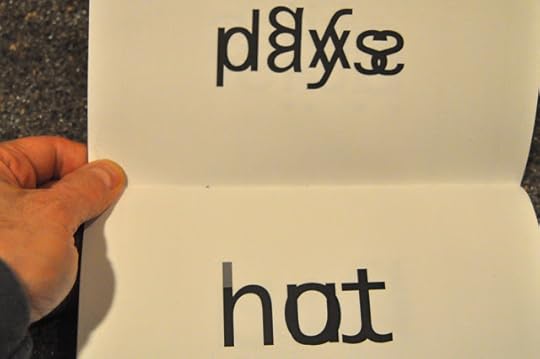
An example of the latter is "plaaayyss," just above, a jovial little visual pwoermd in which the idea of playing (it makes me think of various rides on a playground) is made playfully, through the process of playing with text and finding out what it can do. In the second poem above, four words are overlapping: "hot," "hut," "not," and "nut," the difference between the h and the n noted by the grey of the aitch's ascender. Now, I'm not sure if this makes this poem a hot nut hut or not, but it's doubled t is a beauty, almost a cursive sight.
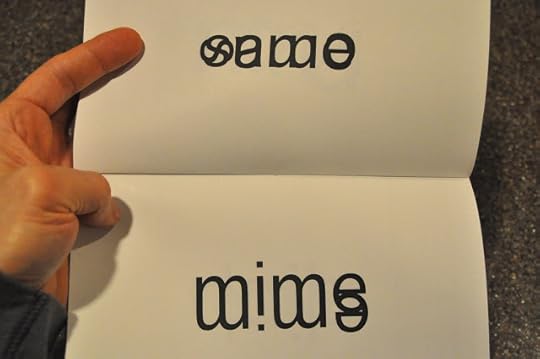
The poem "ssaammee" (note these "titles" are only my sequential transcriptions of these poems) almost seems to spin, especially those esses (which resemble a triskadelion or a fylfot*) and those off-kilter e's. The poem undermines itself, it is all aporia (in the deconstructionist sense), it shows how it is nothing like what it says it is.
And this is the kind of writing I like most: textual, semantic, minimalist, visual, imaginative, and entertaining. I still believe poetry is about entertainment, no matter what else it is, so my thanks to mIEKAL for this book (and for the inspiration, for giving me an idea what I can do on my next birthday), these poems, these words, these letters.
Although there are only 53 copies in the world, the good news is that you can read a digital version online. Though noticeably different from the paper version, you'll get the idea.
_____
* Yes, there's a reason I chose the word "fylfot" in place of other options.
aND, mIEKAL. O'er. i'mprint deluxe: [West Lima, Wisc.], 2010.
ecr. l'inf.
Published on January 06, 2011 19:17
A Poetics (41 Alone, Just Now Restored)
[Karri Kokko noticed that I'd failed to post the 41st entry of my ongoing poetics. It was written months ago (in September), but here it is now for your enjoyment.]
41. Not-Poetry
The limitations of poetry are the limitations of the poet, of the reader of poetry, of the imaginations of both. To insist on defining poetry by what it is not (something to look at without speaking it in a head, a performance of the body, a manipulation of sound divorced from usual semantics) is to imagine a poetry separate from possibility. These possibilities for poetry exist in the word itself, in the interconnections of words in sequences or atomized bursts, in the letter, in the examination of the letter as a visually meaningful substance, in the combination of the word with the image, in the wordless word spoken or sung, in the word performed as words as part of the body in motion, in the word as an aleatoric or interactive digital event.
ecr. l'inf.
41. Not-Poetry
The limitations of poetry are the limitations of the poet, of the reader of poetry, of the imaginations of both. To insist on defining poetry by what it is not (something to look at without speaking it in a head, a performance of the body, a manipulation of sound divorced from usual semantics) is to imagine a poetry separate from possibility. These possibilities for poetry exist in the word itself, in the interconnections of words in sequences or atomized bursts, in the letter, in the examination of the letter as a visually meaningful substance, in the combination of the word with the image, in the wordless word spoken or sung, in the word performed as words as part of the body in motion, in the word as an aleatoric or interactive digital event.
ecr. l'inf.
Published on January 06, 2011 17:24
January 5, 2011
January 4, 2011
write as you — read as you write
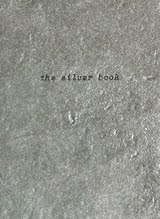 In silver and a sliver of a book held together with words and a bit of tied string sewn through the single or signal signature of the book but not holding the silver cover onto it at all.
In silver and a sliver of a book held together with words and a bit of tied string sewn through the single or signal signature of the book but not holding the silver cover onto it at all.It is called the silver book, and it is a book, not more than a chapbook and maybe less than that, by Jen Bervin.
The entire "text was typed by the author on an olympia de luxe found on union at one summer," and the title of the book is typed, each by hand, on the silver cover of the book folded onto the skeleton of the book.
The typeface of this book is italic, aslant and with little bulbous extremities to each letter with extremities.
The words are simple, printed double-spaced ("Welcome to Typewriter Land," it seems to say), and given to the heavy use of dashes in place of all other possible punctuation.
No capitals. A pleasant wistfulness to the text. Meaning through mild repetition and rhetorical effects. Personal, and (and this is important) imperative.
The voice (and mood) is imperative and almost always telling you to write. (The imperative always suggests but never, in idiomatic speech, says "you.")
And it is about writing. Written as if to a writer. Written as if to a friend.
write to get lost in the day ——
or
write what died for this space —— and
only what will live in it ——
Written as if to a lover
—— tell me —— who touched you all winter
tell me who —— you'll remember —— in
spring
and
garbage smells good —— write it's
spring —— new york —— and you're not
done with me yet ——
A beautiful little book, read, even slowly, in a few minutes, so that it's almost immediately over as running words but continues as an aura, a silver light cast upon you, warm and gently bright, something you feel compelled to write about.
So you do.
_____
Bervin, Jen. the silver book. Ugly Duckling Press: Brooklyn, 2010. US$10
ecr. l'inf.
Published on January 04, 2011 19:36
January 3, 2011
1,2,3,ing
I'm still counting (in order to give a recap of my last year in the world of poetry), and I've come to the disturbing realization that I created over 3,000 poems (visual and otherwise) last year, poems ranging in size from one word to ten or twelve pages, though I could count 366 of those poems as parts of a single poem, and thus feel a little relieved.
ecr. l'inf.
ecr. l'inf.
Published on January 03, 2011 20:23
in the littlest bit of a thing called a word
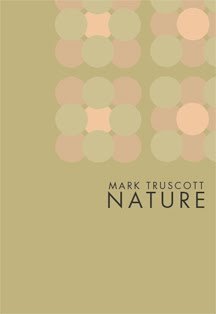 A bird sings a
A bird sings aletter hangs in the balance
It might seem to some that minimalist poetry is always the same, that one minimalist poet's work always resembles another's because the possibilities of minimalism are limited, that there is no significant difference between the work of Robert Lax, Simon Cutts, Robert Grenier, Aram Saroyan, and Mark Truscott.
And Mark Truscott, alone, with nothing more than the example of his own works, prove this wrong.
As if there were such a need. Those who decry the hollowness of minimalist poetry are those who haven't slowed down enough to see it. Even in the realm of the pwoermd, where the poet has nothing but a single word to work with, the different styles of poets is apparent.
And so it is that I turn to Mark Truscott's second book of poetry, Nature, a followup of sorts to, though a completely separate work from, his first book, Said Like Reeds or Things, which introduced us to his minimalist poetry. If anything, Nature is a more decidedly minimalist book, in that it includes no examples of the longer poems that also inhabit his first book. Only a handful of the poems in this book have more than ten words, and never do they have many more words than that.
In a minimalist poem, the smallest things matter.
In the poem that opens this essayette, the opening letter is capitalized. That doesn't happen always with a Truscott poem, not even when the poem forms a sentence, so the capitalization means. Note that two indefinite articles, one majuscule, one minuscule, bookend that line, one outweighing the other, though the second carries the weight of the poem. We can read the first line as a line complete—assuming that the bird sings an a, a certain vowel, a certain note that reminds the poet of that vowel. But the a also begins the sentence of the second line: "a / letter hangs in the balance," as this one does. This letter, this a, this word, hangs between two sentences presented as one, takes on the role of one side of a traditional scale, makes us see the potential, the potential for meaning, in even the smallest words.
So this is what the book does: makes us see language and its nature. (Old mother capitalized Nature making her appearances but not taking over the focus of the book.) And the poems are tight enough, crammed with meaning, cramped into place so deftly in states of precarious balance, that we are forced to think them through just to see what they are. They are of so little visible surface that we must scratch away what little of it there is just to see the workings beneath each of them.
Nature is filled with minimalist traits, sometimes resembling Lax, sometimes Grenier, always Truscott. It plays with the sound and the visible shape of language and it plays with the always unsteady sense of language. These are poems out of kilter, poems that mean by a process of leaning hard over to one side until we see what they must be, and Truscott makes the most of the least, having purified himself, restricted his palette, maybe even his palate. He's eschewed the vagaries and temptations of great (or even moderate) length to focus on his strength.
Which means that he can write a poem that forces us to read right through it twice and then over again, that forces us to see the text as a recirculating text always disagreeing with itself, so one that is always being of the purest amber from which the finest amulet (a charm that glints in the sun and almost gives off a scent) can be made:
do you
still have
it no
I don't
anymore you
_____
Truscott, Mark. Nature . BookThug: Toronto, 2010.
ecr. l'inf.
Published on January 03, 2011 17:12
January 2, 2011
The Texts of Your Life
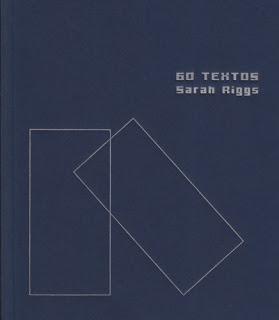
(Attempting to do a better job noting the books I read and what I pull out of them.)
In Tangier I absentThis is not the best of the sixty poems in the book, each assigned its own page, but it is one that captures me mostly for personal reasons. First, I used to live in Tangier, so I know that shoreline, that port, the parents and grandparents of those children playing soccer. The poem resonates for me simply as a reflection of my life. And that's a value. Poetry, even arcane and foreign poetry, captures us by connecting, somehow, to our lives, though not necessarily in such personal ways. But the second sentence of the poem is what makes it valuable to me. As a writer, as a poet, I am trying to be of the world through the process of writing and create the world through that process. Sarah Riggs, in this poem, and in the entire book she has written, 60 Textos, is trying to do the same.
myself from the conference
to watch the ferries
and the shoreline
soccer. Am I not
enough with this world
that I want to write
it, too?
For these are books written in and of the world, during the regular process of living, poems written in the same way a breath is taken: naturally, normally, sitting down, standing, walking, while looking and hearing and being. These are all poems texted from Riggs' blue Nokia cellphone to her friend Omar Berrada's silver Samsung cellphone.
The poems are, thus, short and simple. Their effects are largely not about sound or shape, though their linebreaks are sometimes disconcerting (as in the last one above) and may have been the breaks made naturally on the screen of her cellphone. Their effects are effects of sense, of thinking in the world: lyric poems without any lyric development, sometimes ironic, sometimes wistful, sometimes didactic, always alive in the world, and always personal.
A natural voice thumbed through a keypad unto the world. A refutation of the idea that the technological is somehow not human. An autobiography of a conversation heard from only one direction, this book is a sequence of little joys, a remembrance of the vibrant imagination of a mind in the process of living.
_____
Riggs, Sarah. 60 Textos. Ugly Duckling Presse: Brooklyn, N.Y., 2010. US$12.
ecr. l'inf.
Published on January 02, 2011 10:43



